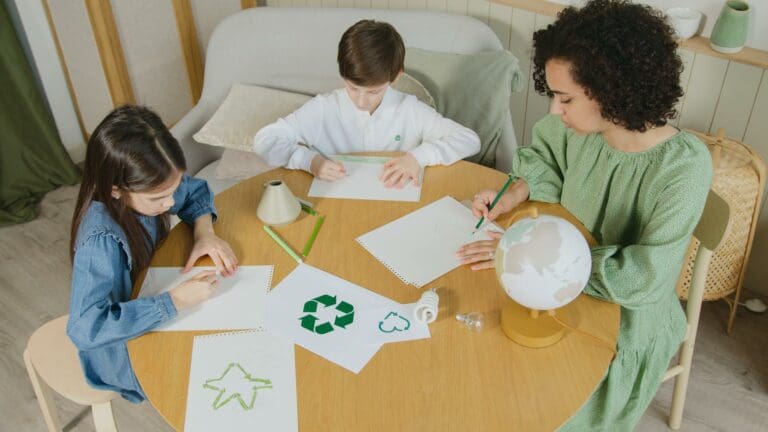Schools have the unique position of shaping the habits and practices of future generations. Schools teach kids how to understand the world around them, including how to be good stewards of the planet. Engaging students to recycle is not just about keeping the school grounds clean, it’s about instilling lifelong habits that contribute to a sustainable future. These lessons have the power to impact not just students, but entire communities too.
The Importance of Recycling Education for Schools
Teaching students about the importance of recycling is the first step to developing lasting sustainable practices. Recycling education for schools offers students an understanding of the impact of waste on the environment, the process of recycling, and the benefits of waste reduction. Beyond the obvious environmental advantages, engaging students to recycle also builds responsibility, teamwork, and a greater awareness of their role in the broader world.
Teaching kids about recycling encourages responsible behaviour, and students are more likely to adopt these habits when they understand why recycling matters. For example, classroom discussions on the benefits of recycling can cover topics like conserving natural resources, reducing landfill waste, and preventing pollution. Recycling education can also illustrate the potential for students to make an immediate difference in their own communities.
Practical Ways to Engage Students to Recycle
Learning how to encourage students to recycle can be straightforward with the right approach. Here are some practical methods for promoting recycling at school:
1. School Recycling Programs
School programs provide students with a structured way to participate in recycling daily. Schools can place clearly labelled recycling bins in classrooms, hallways, and common areas, making recycling convenient and accessible. These bins should be monitored for correct use, and younger students can receive guidance on separating different types of waste to avoid contamination. Including students in the recycling program by assigning roles like “recycling monitors” can increase their sense of ownership and responsibility.
2. Recycling Competitions
Incentive programs for student recycling are an effective way to boost participation. Competitions can be held between classes or grade levels to see who can recycle the most over a set period. Rewarding the winners with eco-friendly prizes, like reusable water bottles or notebooks made from recycled paper, reinforces the benefits of sustainable practices for students. Recycling competitions for students make waste reduction fun and create a positive association with recycling.
3. Environmental Clubs
Environmental clubs provide a platform for student-led environmental projects, discussions, and activities. These clubs can organise regular clean-ups, educate others about the importance of waste reduction, and lead recycle awareness campaigns in schools. Environmental clubs can also set up events like Earth Day activities, during which students learn more about reducing waste in schools and beyond.
4. Hands-On Recycling Projects
Hands-on projects allow students to use recyclable materials to create new items. For example, art projects using recycled plastic, cardboard, or paper can demonstrate the practical ways materials can be reused. Such recycling activities for students can be incorporated into art or science lessons, showing students how to reduce waste by repurposing items that would otherwise end up in landfills.
5. Educational Field Trips and Workshops
Field trips to recycling centres or waste diversion facilities offer valuable insights into what happens to waste after it leaves the school grounds. Students learn about the recycling process firsthand, which can be far more impactful than a classroom lesson. In-school workshops led by recycling experts can also educate students on why recycling is essential and highlight current issues like plastic waste.

Sustainable Practices Beyond Recycling
Encouraging students to recycle is a great start, but fostering an eco-friendly mindset should also include broader sustainable practices. Schools can introduce initiatives that go beyond recycling bins, such as promoting reusable water bottles, lunch containers, and cutlery. Composting programs, energy-saving measures, and reduced paper use can complement recycling efforts, further reducing waste in schools and instilling sustainable values in students.
Cultivating environmental awareness among students is key to a greener future. As students learn more about why they should recycle, they become empowered to take responsibility for their impact on the planet, creating a positive ripple effect that benefits society. Through continued efforts in recycling education and sustainable practices, schools can inspire the next generation of environmental advocates.

